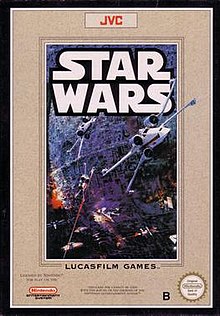Star Wars (1991 video game)
| Star Wars | |
|---|---|
 European NES cover art | |
| Developer(s) | Lucasfilm Games (NES) Beam Software (NES)[3] NMS Software (GB)[4] Tiertex (GG/MS)[6][7] |
| Publisher(s) | |
| Designer(s) | Akila Redmer |
| Programmer(s) | Andrew Carter |
| Artist(s) | Gary Winnick Harrison Fong Armand Cabrera Jon Knoles |
| Composer(s) | Marshall Parker |
| Platform(s) | Nintendo Entertainment System, Game Boy, Master System, Game Gear |
| Release | |
| Genre(s) | Action, platformer |
| Mode(s) | Single-player |
Star Wars is an action game based on the film Star Wars. It was released by Victor Musical Industries for the Family Computer in Japan on November 15, 1991 and by JVC Musical Industries for the Nintendo Entertainment System in North America in November 1991 and in Europe on March 26, 1992. An official mail order "Hint Book" was available for the game upon its release.[8]
Two versions for handheld game consoles were released. The Game Boy port was developed by NMS Software and published by Capcom and released shortly less than a year later in 1992. The Game Gear port was developed by Tiertex Design Studios and published by U.S. Gold and released in 1993.[9] A Master System version was also released.
The game was followed by a sequel with Star Wars: The Empire Strikes Back in 1992. An NES game adaptation of Return of the Jedi never came into fruition. A counterpart of the game for the Super NES titled Super Star Wars was developed and released.
On June 28, 2019, the NES and Game Boy versions were re-released as part of both standard and "Collector's Edition" sets in limited quantities on unlicensed replica game cartridges by Limited Run Games.
Gameplay
[edit]
The game follows a sequence of events loosely based on the plot of Star Wars, where Luke Skywalker is required to pilot a landspeeder around Tatooine, collect R2-D2 from the Sandcrawler, Obi-Wan Kenobi from a cave, and Han Solo from the Mos Eisley bar, all while fighting stormtroopers, Tusken Raiders, and many other different enemy characters from the movies. After assembling all the game's characters, the player must navigate the Millennium Falcon in a first-person perspective through an asteroid field to reach the Death Star (shields for the Millennium Falcon to withstand the asteroid field must also be collected in the Tatooine levels). Once arriving at the Death Star, the player is required to destroy the tractor beam generator, rescue Princess Leia from the detention block, then proceed to destroy the Death Star with the rebel fighters.
Each character has their own attributes. Han Solo and Leia can also be used to replace Luke in gameplay, but unlike Luke who has numerous lives, Han and Leia only have one life each. Obi-Wan Kenobi can resurrect Han Solo or Princess Leia five times (in the Game Gear and Master System versions, the player is even required to kill and resurrect them in order to earn the last 10% completion points and see the ending), R2-D2 can display a map of the Death Star hallways, and C-3PO can provide information on the current part of the game. Darth Vader makes his only appearance on the Game Over screen.
Chewbacca appears at the end of the Game Boy version, and is mentioned in passing several times in the NES version. It is implied in the game's instruction manual that Chewie flies the Millennium Falcon if Han Solo dies.
The Game Gear version has several exclusive levels, including a level that sees Leia delivering the stolen plans to R2-D2. Additionally, the Tatooine hub world does not appear in this version, and is replaced with three side-scrolling levels through the desert that Luke is required to travel on foot.[citation needed]
Reception
[edit]Victor Lucas of The Electric Playground gave the Game Gear version a 7 out of 10 and wrote, "Star Wars does feature some impressive artistic design and a few technical surprises. It's still one of the sharpest looking games available for Sega's 8-bit portable".[9]
The Game Gear version was a runner-up for GamePro's 1993 Hand-Held Game of the Year award.[12]
References
[edit]- ^ "NES Games" (PDF). Nintendo of America. Archived from the original (PDF) on June 11, 2014. Retrieved August 9, 2015.
- ^ https://www.famitsu.com/games/t/1903/
- ^ a b c d "Famicom and NES Information". Retrieved 2013-11-01.
- ^ a b c d e f g "Game Boy Information". Retrieved 2013-11-01.
- ^ "Master System Review" (PDF). Sega Power. Future plc. p. 58. Retrieved 24 September 2024.
- ^ a b "Game Gear Information". Retrieved 2013-11-01.
- ^ a b "Master System Information". Retrieved 2013-11-01.
- ^ "Star Wars: Hint Book, publication details". Retrieved 2014-12-29.
- ^ a b Lucas, Victor (1997-05-26). "Star Wars (Game Gear) review". The Electric Playground. Archived from the original on 1997-06-18.
- ^ Christopher Michael Baker. "Star Wars (NES) Review". Allgame. Archived from the original on November 16, 2014. Retrieved November 22, 2022.
- ^ Sutyak, Jonathan. "Star Wars (Game Gear) Review". Allgame. Archived from the original on November 15, 2014. Retrieved November 22, 2022.
- ^ "Editor's Choice Awards". GamePro. No. 55. IDG. February 1994. p. 23.
External links
[edit]- 1991 video games
- Beam Software games
- Capcom games
- Game Boy games
- Game Gear games
- LucasArts games
- Master System games
- Nintendo Entertainment System games
- NMS Software games
- Platformers
- Single-player video games
- Star Wars (film) video games
- Tiertex Design Studios games
- Video games featuring female protagonists
- Video games developed in Australia
- U.S. Gold games
- Ubisoft games
